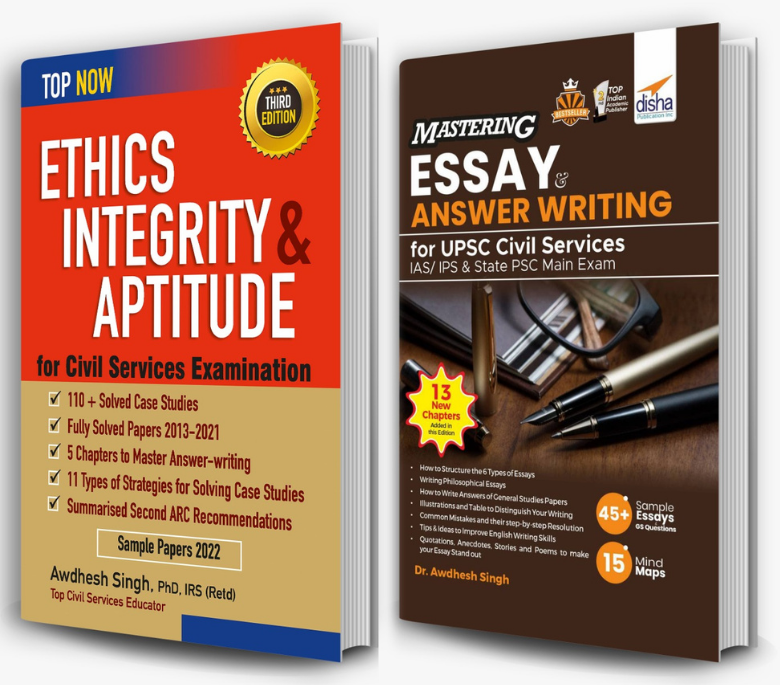Solved Ethics Papers
Topics
All
Civil Services in India (26)
Ethics, Integrity and Aptitude
» Chapters from Book (11)
» Case Studies (8)
Solved Ethics Papers
» CSE - 2013 (18)
» CSE - 2014 (19)
» CSE - 2015 (17)
» CSE - 2016 (18)
» CSE - 2017 (19)
» CSE - 2018 (19)
» CSE - 2019 (19)
» CSE - 2020 (19)
» CSE - 2021 (19)
» CSE -2022 (17)
» CSE-2023 (17)
Essay and Answer Writing
» Quotes (34)
» Moral Stories (18)
» Anecdotes (11)
» Beautiful Poems (10)
» Chapters from Book (5)
» UPSC Essays (40)
» Model Essays (38)
» Research and Studies (4)
Economics (NCERT) Notes
» Class IX (14)
» Class X (16)
» Class XI (55)
» Class XII (53)
Economics Current (51)
International Affairs (20)
Polity and Governance (61)
Misc (77)
Select Topic »

Civil Services in India (26)
Ethics, Integrity and Aptitude (-)
» Chapters from Book (11)
» Case Studies (8)
Solved Ethics Papers (-)
» CSE - 2013 (18)
» CSE - 2014 (19)
» CSE - 2015 (17)
» CSE - 2016 (18)
» CSE - 2017 (19)
» CSE - 2018 (19)
» CSE - 2019 (19)
» CSE - 2020 (19)
» CSE - 2021 (19)
» CSE -2022 (17)
» CSE-2023 (17)
Essay and Answer Writing (-)
» Quotes (34)
» Moral Stories (18)
» Anecdotes (11)
» Beautiful Poems (10)
» Chapters from Book (5)
» UPSC Essays (40)
» Model Essays (38)
» Research and Studies (4)
Economics (NCERT) Notes (-)
» Class IX (14)
» Class X (16)
» Class XI (55)
» Class XII (53)
Economics Current (51)
International Affairs (20)
Polity and Governance (61)
Misc (77)

Q8. Ethical Issues Involved in Arms Trade
Q: The Chairman of Bharat Missiles Ltd (BML) was watching a program on TV wherein the Prime Minister was addressing the nation on the necessity of developing a self-reliant India. He subconsciously nodded in agreement and smiled to himself as he mentally reviewed BML’s journey in the past two decades. BML had admirably progressed from producing first generation anti-tank guided missiles (ATGMS) to designing and producing state of the art ATGM weapon systems that would be the envy of any army. He sighed in reconciliation with his assumptions that the government would probably not alter the status quo of a ban on export of military weaponry.
To his surprise, the very next day he got a telephone call from the Director General, Ministry of Defence, asking him to discuss the modalities of increasing BML production of ATGMS as there is a possibility of exporting the same to a friendly foreign country. The Director General wanted the Chairman to discuss the details with his staff at Delhi next week.
Two days later, at a press conference, the Defence Minister stated that he aims to double the current weapons export levels within five years. This would give an impetus to financing the development and manufacture of indigenous weapons in the country. He also stated that all indigenous arms manufacturing nations have a very good record of international arms trade. As Chairman of BML, what are your views on the following points?
(a) As an arms exporter of a responsible nation like India, what are the ethical issues involved arms trade?
(b) List five ethical factors that would influence the decision to sell arms to foreign governments.
(250 words) (20 marks)
Answer:
International arms trade is a lucrative business because of high profit. India has been one of the largest importers of arms in the world as it did not have the indigenous capacity to build international-class war equipment. The Indian government thus wants to manufacture arms indigenously to reduce its dependence on import and also to export it to make the domestic industries a profitable business by bringing economy of scale. However, arms trade raises numerous ethical issues. Those who produce and sell arms have been called ‘merchants of death’, because the arms are finally used to kill people. India has always been a votary of non-violence and peace. Hence, the export of arms as a state policy could be considered against the principle of non-violence.
Hence, India faces a conflict between the desire to generate profits from selling arms and the ethical reasons for not promoting instruments capable of inflicting widespread suffering. The task of deciding when a government or group is likely to use acquired weapons for ‘legitimate’ purposes can be very difficult. The ethical factors that may affect the sale of arms to a foreign government are as follows:
1. Arms should be sold only to peaceful nations for self-defence
2. Arms should not be sold with a profit motive to the highest bidder.
3. Arms should not be used by the buyer to wage wars against peaceful countries.
4. Arms should not be used for human rights violation.
5. Arms should not be accessed by terrorists or criminals.
-(251 words)-

Looking for a One-stop Solution to prepare for ‘Ethics, Integrity, and Aptitude’ and ‘Essay and Answer Writing’ for UPSC?
Buy Dr. Awdhesh Singh’s books from the links below-
Buy Dr. Awdhesh Singh’s books from the links below-
Ethics, Integrity & Aptitude for Civil Services Examination
Amazon - https://amzn.to/3s1Qz7v
Flipkart - https://bit.ly/358N2uY
Mastering Essay & Answer Writing for UPSC Civil Services
Amazon - https://amzn.to/3JELE2h
Flipkart - https://bit.ly/3gVIwmv
| Related Articles |
| Recent Articles |
